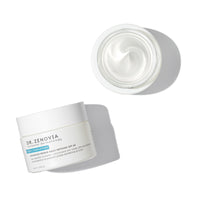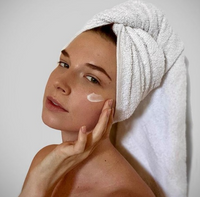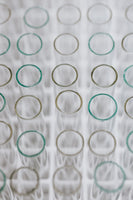Skincare Ingredients You Should Never Mix | Question for the Derm

Dr. Zenovia Skincare seeks to address every hormone-related skincare concern, from acne to skin aging with science-backed by research and clinical trials. In our series, “Question for the Derm”, Dr. Zenovia will be answering your top questions about hormones & skin. Below, Dr. Zenovia shares skincare ingredients you should never use in the same skincare routine to avoid irritation and sensitivity.
Skincare Ingredients You Should Never Mix
Ingredients you should avoid using in the same skin regimen include retinol and actives, vitamin c and retinol, and benzoyl peroxide with retinol as well as tretinoin.
Retinol
Retinol increases the skin’s cellular turnover rate and helps regulate desquamation (skin shedding). To avoid irritation and dryness, retinol should not be combined with other actives in the same skincare routine (especially if your skin is sensitive). Retinol should always be used at night.
After using a retinol, follow up with a rich moisturizer to keep your skin hydrated and barrier protected. Dr. Zenovia’s Peptide + Ceramide Repairing Moisturizer, ideal for even the most sensitive skin on retinoid treatment, contains a unique combination of bio-equivalent ceramides, potent humectants, and emollients to help attract, retain, and distribute moisture to fortify the skin’s protective barrier and combat dryness for a glowing, radiant complexion.
Additionally, retinol should not be used alongside benzoyl peroxide as these ingredients can cancel each other out, making them less effective.
Vitamin C
A powerful antioxidant that protects the skin from free radical damage and promotes collagen synthesis, Vitamin C fights against sun damage and reduces the appearance of an uneven skin tone and hyperpigmentation. Vitamin C should always be used in the morning and worn under sunscreen. These ingredients complement each other and work to fight against UV damage.
Since retinol’s function is to build collagen and help repair the skin overnight, vitamin c and retinol should not be used in the same routine. These actives have different functions and can cause irritation if used together, especially for those with sensitive skin.
Dr. Zenovia’s Vitamin C Brightening Toner can be applied after cleansing each morning. Rich in Vitamins C & E, this antioxidant-rich toner brightens the skin and calms redness while Micronutrient Sea Salt helps neutralize pore-clogging impurities to restore the look of radiant, healthy skin.
Benzoyl Peroxide
A chemical compound that oxidizes on the skin, releasing oxygen to destroy pore-clogging bacteria, benzoyl peroxide is anti-inflammatory, comedolytic, and anti-bacterial meaning it decreases skin inflammation, opens the pores, exfoliates the surface layer of skin, removes excess sebum, and kills bacteria. These properties make it a powerful acne-fighting skin agent. Since benzoyl peroxide is a drying ingredient, it is best to use benzoyl peroxide alongside other gentle, hydrating topicals.
While both benzoyl peroxide and retinol are powerful acne-fighting ingredients, benzoyl peroxide should not be used in the same routine as retinol or tretinoin. Depending on their formulations, mixing these ingredients can deactivate their potency when combined. Dr. Zenovia recommends using benzoyl peroxide in the morning and retinol at night to avoid layering these two ingredients.
Read more: How to Repair Damaged Skin Barrier






















Leave a comment